11 Oct 2016 | Digital Freedom, Magazine, Volume 45.03 Autumn 2016
[vc_row][vc_column][vc_column_text]

CREDIT: ra2studio / Shutterstock
Securing your connection
Activists in countries where the web is heavily censored and internet traffic is closely monitored know that using a virtual private network or VPN is essential for remaining invisible.
A VPN is like a pair of curtains on a house: people know you are in but cannot see what you are doing. This is achieved by creating an encrypted tunnel via a private host, often in another country, through which your internet data flows. This means that anyone monitoring web traffic to find out persons of interest is unable to do so. However, the very fact that you are using a VPN may raise eyebrows.
An increasing number of VPNs promise truly anonymous access and do not log any of your activity, such as ExpressVPN and Anonymizer. However, access to some VPN providers is blocked in some countries and their accessibility is always changeable.
Know your onions
One of the internet’s strengths is also one of its weaknesses, at least as far as privacy is concerned. Traffic passes over the internet in data packets, each of which may take a different route between sender and recipient, hopping between computer nodes along the way. This makes the network resilient to physical attack – since there is no fixed connection between the endpoints – but also helps to identify the sender. Packets contain information on both the sender’s and recipient’s IP address so if you need anonymity, this is a fatal flaw.
“Onion” routing offers more privacy. In this, data packets are wrapped in layers of encryption, similar to the layers of an onion. At each node, a layer of encryption is removed, revealing where the packet is to go next, the benefit being that the node only knows the address details of the preceding and succeeding nodes and not the entire chain.
Using onion routing is not as complicated as it may sound. In the mid-1990s, US naval researchers created a browser called TOR, short for The Onion Routing project, based on the concept and offered it to anyone under a free licence.
Accessing the dark web with the Tor browser is a powerful method of hiding identity but is not foolproof. There are a number of documented techniques for exploiting weaknesses and some people believe that some security agencies use these to monitor traffic.
Put the trackers off your scent
Every time you visit a popular website, traces of your activity are carefully collected and sifted, often by snippets of code that come from other parts of the web. A browser add-on called Ghostery (ghostery.com) can show you just how prevalent this is. Firing up Ghostery on a recent visit to The Los Angeles Times website turned up 102 snippets of code designed to track web activity, ranging from well-known names such as Facebook and Google but also lesser known names such as Audience Science and Criteo.
While some of this tracking has legitimate uses, such as to personalise what you see on a site or to tailor the ads that appear, some trackers, particularly in countries where there are lax or no rules about such things, are working hard to identify you.
The problem is that trackers can work out who you are by jigsaw identification. Imagine you have visited a few places on the web, including reading an online article in a banned publication and then flicking through a controversial discussion forum. A third-party tracker used for serving ads can now learn about this behaviour. If you then subsequently log into another site, such as a social network, that includes your identity, this information can suddenly be linked together. Open-source browser extensions such as Disconnect (disconnect.me) offer a way to disable such trackers.
Use the secure web
A growing number of popular websites force visitors to connect to them securely. You can tell which ones because their addresses begin with https rather than http. Using https means that the website you are visiting will be authenticated and that your communications with the site are encrypted, stopping so-called man-in-the-middle attacks – where a malicious person sits between two people who believe they are communicating directly with each other and alters what is being communicated. Google, as well as using https for both Gmail and search, is also encouraging other websites to adopt it by boosting such sites up the search rankings.
Rather than remembering to check you are using https all the time, some people employ a browser extension created by the Electronic Frontier Foundation and the Tor Project called HTTPS Everywhere to do it for them. It is available for Chrome, Firefox and Opera and forces browsers to user https versions of sites where available.
Hide your fingerprints
Traditional identification methods on the web rely on things like IP addresses and cookies, but some organisations employ far more sophisticated techniques, such as browser fingerprinting. When you visit a site, the browser may share information on your default language and any add-ons and fonts you have installed. This may sound innocuous, but this combination of settings may be unique to you and, while not letting others know who you are, can be used to associate your web history with your browser’s fingerprint. You can see how poorly you are protected by visiting panopticlick.eff.org.
One way to try to avoid this is to use a commonly used browser set-up, such as Chrome running on Windows 10 and only common add-ins activated and the default range of fonts. Turning off Javascript can also help but also makes many sites unusable. You can also install the EFF’s Privacy Badger browser add-on to thwart invisible trackers.
Mark Frary is a journalist and co-author of You Call This The Future?: The Greatest Inventions Sci-Fi Imagined and Science Promised (Chicago Review Press, 2008)
This article is from the Autumn issue of Index on Censorship Magazine. You can order your copy here, or take out a digital subscription via Exact Editions. Copies are also available at the BFI, the Serpentine Gallery, MagCulture, (London), News from Nowhere (Liverpool), Home (Manchester), Calton Books (Glasgow) and on Amazon. Each magazine sale helps Index on Censorship continue its fight for free expression worldwide.[/vc_column_text][/vc_column][/vc_row][vc_row][vc_column][vc_custom_heading text=”From the Archives”][vc_row_inner][vc_column_inner width=”1/3″][vc_single_image image=”90642″ img_size=”213×289″ alignment=”center” onclick=”custom_link” link=”http://journals.sagepub.com/doi/pdf/10.1080/03064220008536724″][vc_custom_heading text=”Anonymous now” font_container=”tag:p|font_size:24|text_align:left” link=”url:http%3A%2F%2Fjournals.sagepub.com%2Fdoi%2Fpdf%2F10.1080%2F03064220008536724|||”][vc_column_text]
May 2000
Surfing through cyberspace leaves a trail of clues to your identity. Online privacy can be had but it doesn’t come easy, reports Yaman Akdeniz.
[/vc_column_text][/vc_column_inner][vc_column_inner width=”1/3″][vc_single_image image=”89179″ img_size=”213×289″ alignment=”center” onclick=”custom_link” link=”http://journals.sagepub.com/doi/pdf/10.1080/03064220701738651″][vc_custom_heading text=”Evasion tactics” font_container=”tag:p|font_size:24|text_align:left” link=”url:http%3A%2F%2Fjournals.sagepub.com%2Fdoi%2Fpdf%2F10.1080%2F03064220701738651|||”][vc_column_text]
November 2007
Nart Villeneuve provides an overview of how journalists and bloggers around the world are protecting themselves from censorship.
[/vc_column_text][/vc_column_inner][vc_column_inner width=”1/3″][vc_single_image image=”89164″ img_size=”213×289″ alignment=”center” onclick=”custom_link” link=”http://journals.sagepub.com/doi/pdf/10.1177/0306422010363345″][vc_custom_heading text=”Tools of the trade” font_container=”tag:p|font_size:24|text_align:left” link=”url:http%3A%2F%2Fjournals.sagepub.com%2Fdoi%2Fpdf%2F10.1177%2F0306422010363345|||”][vc_column_text]
March 2010
As filtering becomes increasingly commonplace, Roger Dingledine reviews the options for beating online censorship.
[/vc_column_text][/vc_column_inner][/vc_row_inner][vc_separator][/vc_column][/vc_row][vc_row][vc_column width=”1/3″][vc_custom_heading text=”The unnamed” font_container=”tag:p|font_size:24|text_align:left” link=”url:%20https%3A%2F%2Fwww.indexoncensorship.org%2F2017%2F09%2Ffree-to-air%2F|||”][vc_column_text]The autumn 2016 Index on Censorship magazine explores topics on anonymity through a range of in-depth features, interviews and illustrations from around the world.
With: Valerie Plame Wilson, Ananya Azad, Hilary Mantel[/vc_column_text][/vc_column][vc_column width=”1/3″][vc_single_image image=”80570″ img_size=”medium” alignment=”center” onclick=”custom_link” link=”https://www.indexoncensorship.org/2016/11/the-unnamed/”][/vc_column][vc_column width=”1/3″][vc_custom_heading text=”Subscribe” font_container=”tag:p|font_size:24|text_align:left” link=”url:https%3A%2F%2Fwww.indexoncensorship.org%2Fsubscribe%2F|||”][vc_column_text]In print, online. In your mailbox, on your iPad.
Subscription options from £18 or just £1.49 in the App Store for a digital issue.
Every subscriber helps support Index on Censorship’s projects around the world.
 SUBSCRIBE NOW[/vc_column_text][/vc_column][/vc_row]
SUBSCRIBE NOW[/vc_column_text][/vc_column][/vc_row]
3 Oct 2016 | Bahrain, Events, mobile, United Kingdom

Nabeel Rajab during a protest in London in September 2014 (Photo: Milana Knezevic)
Join Index on Censorship, English Pen and the Bahrain Institute for Rights and Democracy for a vigil outside the Foreign and Commonwealth Office at 12 pm on Thursday 6 October to mark the trial of Bahraini human rights activist Nabeel Rajab, who could be sentenced to up to 15 years in prison.
The Index on Censorship Freedom of Expression Award-winning Rajab has been subjected to ongoing judicial harassment by Bahrain’s government.
Your support will show the UK government that it must do more to pressure its ally Bahrain to respect freedom of expression and release Rajab unconditionally.
When: Thursday 6 October at 12pm
Where: Foreign and Commonwealth Office, King Charles Street, Whitehall, London SW1A 2AH (Map)
More information about Nabeel Rajab:
Bahrain: Nabeel Rajab put in isolation ahead of 6 October trial
Prince Charles to visit Bahrain: Here are some things he should consider
Who is Nabeel Rajab?
Background
Nabeel Rajab was arrested on 13 June and prosecuted on charges of spreading “false or malicious news, statements, or rumours” during wartime, “offending a foreign country” and “offending a public institution” under articles 133, 215 and 216 of the Penal Code and faces up to 15 years’ imprisonment. His sentencing is due on 6 October 2016. Nabeel has also been banned from travel ban since November 2014.
This is in connection to comments made on Twitter in 2015 documenting allegations of torture at the Central Jau Prison and criticizing the Saudi coalition war in Yemen.
Following the publication a letter by
Nabeel to the New York Times, the Public Prosecution Office
charged him with “intentionally broadcasting false news and malicious rumours abroad impairing the prestige of the state”. The charge could lead to an additional one-year prison sentence.
FCO Policy on Nabeel and Bahrain
The FCO has
expressed “concern” over the re-arrest of
Nabeel but has not called for his release.
The UK’s statements do not reflect the facts on the ground: Bahrain’s human rights situation is worsening. Nabeel‘s charges, all related to his free expression and carrying lengthy prison terms, are a reflection of Bahrain’s failure to reform.
21 Sep 2016 | Bahrain, Bahrain News, Middle East and North Africa, mobile, News and features

Bahraini human rights defender Nabeel Rajab (Photo: The Bahrain Institute for Rights and Democracy)
Prince Charles is to make an official visit to Bahrain in November despite the escalating human rights crackdown in the country. This endorsement comes after Queen Elizabeth sat next to the king of Bahrain at her 90th birthday celebrations this summer.
Last week, the UN Human Rights Council commissioner Zeid Ra’ad Al Hussein expressed grave concerns about the country: “The past decade has demonstrated repeatedly and with punishing clarity exactly how disastrous the outcomes can be when a government attempts to smash the voices of its people, instead of serving them.”
Today, Sayed Ahmed Alwadaei, director of advocacy at the Bahrain Institute for Rights and Democracy, told The Times: “The timing of Prince Charles’s visit suggests that the major human rights violations in 2016 are not in the British monarchy’s mind.”
Here are just a few things Index on Censorship would encourage the prince to keep in mind ahead of his trip:
1. The treatment of Nabeel Rajab
Human rights campaigner Nabeel Rajab, who has been arrested multiple times because of his peaceful activism, has been detained since 13 June for comments he made on Twitter. Charges brought against him for his tweets, and even retweets, include spreading “false or malicious news, statements, or rumours”, “offending a foreign country” and “offending a statutory body”.
Rajab was also recently charged with “defaming the state” after a critical op-ed he wrote appeared in The New York Times.
Just last week, the UK government was urged by a group of 50 NGOs to put pressure on Bahrain over Rajab’s treatment. With news of the state-sanctioned Prince Charles visit, it appears these calls have of fallen on deaf ears.
Rajab is expected to be sentenced at his next court hearing on 6 October. He faces more than 15 years in prison.
2. The detention of critics
The Bahraini government has repeatedly used prison as a weapon to silence its critics. Opposition activist Zainab Al-Khawaja was sentenced to three years in prison in December 2014 for “insulting the king” after she ripped up a picture of him. Though she has now been released, her father Abdulhadi Al-Khawaja, a human rights activist and a member of the Bahrain 13, remains in prison along with over 3,500 other prisoners of conscience.
On 22 June 2011 a military court sentenced all members of the Bahrain 13 to between five years and life in prison, on trumped-up charges of attempting to overthrow the regime, “broadcasting false news and rumours” and “inciting demonstrations”. All but two of them remain behind bars.
Last year, the Liberties and Human Rights Department of Al-Wefaq National Islamic Society recorded a total of 1,765 arrests by security services for reasons related to the opposition political movement, including the detention of 120 children and five women.
3. Rendering critics stateless
Another abusive tactic used by the government of Bahrain is to revoke the citizenship of many of its critics. This is illegal under several international agreements, including the Universal Declaration of Human Rights and the International Covenant on Civil and Political Rights. Regardless, 208 Bahrainis were rendered stateless in 2015 alone.
Since amending its citizenship law in 2014, Bahrain’s judges can strip citizenship from anyone convicted under anti-terrorist laws. However, the law does not properly define “terrorism” and several of those subjected to this fate in 2015 were convicted under vague terms such as “inciting and advocating regime change” to “defaming brotherly countries”.
Most of those rendered stateless have been deported, along with their families.
4. Censoring the internet
Named by Reporters Without Borders as an “enemy of the internet“, Bahrain has been busy clamping down on the web over the last few years. Despite being one of the best-connected countries in the world from a technical perspective, Freedom House gives the country an online freedom rating of 72, with 100 being the worst possible score.
News, human rights and opposition websites are routinely blocked, with estimates putting the total number at over 1,000. Social media users have been arrested and had posts forcibly removed, including those of the satirical account @Takrooz whose only post is now: “They tortured me in prison.”
The government is also working on a new Russian-inspired default search engine that would allow it to filter results without the cooperation of Western-based companies such as Netsweeper, which was exposed by the Associated Press as a facilitator of Bahrain’s censorship program.
21 Sep 2016 | Magazine, mobile, News and features, Volume 45.02 Summer 2016 Extras, Youth Board
In the latest issue of Index on Censorship magazine, The Unnamed: Does anonymity need to be defended?, Index’s contributing editor for Turkey, Kaya Genç, explores anonymous artists in Turkey. In the piece the artists discuss how vital anonymity is in allowing them to complete their more controversial work. The Index on Censorship youth advisory board have taken inspiration from this piece for their latest task, in which they investigate anonymous art around the world.
Keizer by Constantin Eckner
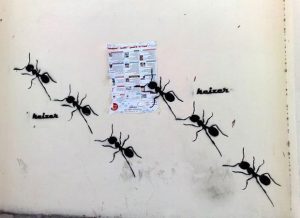
Ants feature in Keizer’s work to sybolise “the forgotten ones, the silenced, the nameless, those marginalised by capitalism”. Image: Keizer
Prior to the January 25 Revolution political street art was anything but common in Egypt, yet it has proliferated in public spaces in the aftermath of the revolution. One of the most productive street artists in Cairo is Keizer, who has gained popularity and notoriety in recent years. Like Banksy and other street artists, he uses the well-known stencil technique to empower his fellow countrymen, and people in general, with his thought-provoking work. He likens people to ants, which are featured in most of his graffiti. Keizer explains on his Facebook account that the ant “symbolises the forgotten ones, the silenced, the nameless, those marginalised by capitalism. They are the working class, the common people, the colony that struggles and sacrifices blindly for the queen ant and her monarchy.”
Asked about the reason for protecting his identity, Keizer said: “I am very concerned over my safety and the repercussions of street art which I’ve already had a taste of, especially with this current regime. Including death threats,
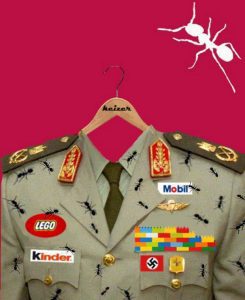
Egyptian street artist Keizer has gained popularity in recent years. Image: Keizer
my twitter account was hacked twice. In the past five years of working on the street I’ve been caught once. I came out of it with a few bumps and bruises, nothing major. I consider myself lucky that I came out one day later.
“You can imagine that being caught here is very different than being caught in Europe. There is no proper procedure and that makes you a victim of the person handling you, and the uncertainty of what comes next. Graffiti is a grey area here, they don’t have any definition or classification for it in the books, so they make it up as they go along, taking you for the fear ride. It’s all under vandalism, so they can make it look small or escalate it to exaggerated levels. For instance, you can be dubbed as a political traitor; it can be considered racketeering; they can glue your name to any political movement unpopular with the people…etc.”
Tall walls, low profiles: Icy and Sot by Layli Foroudi
Icy and Sot describe themselves as stencil artists from Tabriz, Iran. As for their identities, they reveal only that they are brothers, born in 1985 and 1991. Their work is created under pseudonyms in countries around the world, including Iran, USA, Germany, Norway, and China, on legal and illegal walls as well as in galleries.
The anonymous duo, who paint on themes like human rights, censorship, and justice, say that charges against artists in Iran make going public risky.
“Pseudonyms help us to keep a low profile,” the brothers explained in an interview with ArtInfo, “Being arrested in Iran is completely different, because they charge you with crimes that you have not even committed, like Satanism or political crimes.”
Their work often uses striking human faces in black and white to make statements about politics and the environment, to call for peace, and to direct messages at the government of Iran. In 2015, Icy and Sot used their art to protest for freedom of expression in Iran, prompted by the arrest and 18-month imprisonment of Atena Farghadani, an Iranian artist who was detained for publishing a cartoon that satirised the Iranian government as animals. In solidarity, they stenciled a tribute piece depicting Farghadani with a backdrop of protesters on a wall in Brooklyn.
Maeztro Urbano’s fight to change a criminal image by Ian Morse.
In the most recent data, Honduras has the highest homicide rate in the world, with 84 intentional homicides per 100,000 people in 2013. The prominence of drug trafficking and ubiquity of poverty does not improve its reputation.
To some Hondurans, their country’s international image has done nothing but hurt citizen’s attempts to improve daily life in the country’s bustling cities and lively cultural centers. Maeztro Urbano and his friends became the face of an urban street art project to disrupt the atmosphere of crime and reveal another side of the country outside of the headlines.
His projects range from adjusting street signs promoting gender equality to vandalising billboards with corrupt politicians, to wall graffiti showing the effect of violence on children. Working his day shifts in the advertising industry, Maeztro Urbano said he wants to contribute more to his country than proliferating consumerism.
“Change should start within society. With each individual,” El Maestro – as he is also called – told The Creators Project. “To have respect for the lives of others, to respect the right to sexual diversity, to a better education.”
“If we don’t change that as a society and as individuals, we will never be able to change as a country.”
Assailants in Honduras have not been very hospitable to those reporting on crime or those wishing to express their identity. Faced with police harassment and shootings from unknown attackers, Maeztro Urbano chooses to wear a mask while he works to spread messages of hope around the country.
Bleeps.gr: Over a decade of political artivism in Athens by Anna Gumbau.
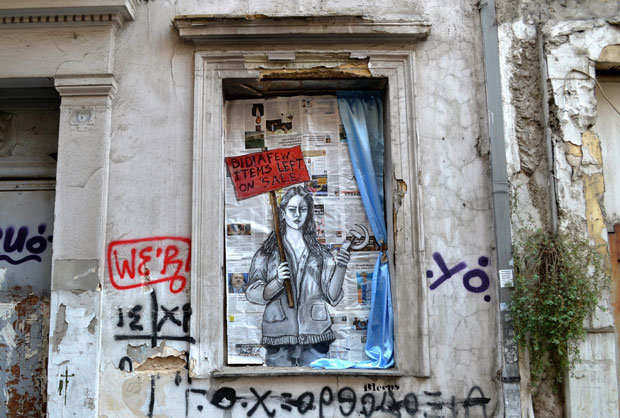
Bleeps.gr is one of Greece’s most prominent street artists, having painted murals on the streets of Athens for over 10 years. Image: Bleeps.gr
“I have been radically oriented to the political discourse, utilising the public sphere, and I am not afraid or discouraged”, Bleeps.gr, one of the most prominent Greek street artists, told Index.
Bleep.gr has been designing murals, that are mostly critical of the austerity policies imposed to Greece, on the streets of Athens for over 10 years. The Greek social turmoil has had a strong influence on his artwork, not only in his scenes, but even in his methods. “I buy very cheap materials and can’t afford those impressive equipment to create a mural”, he said in an interview with Street Art Europe.
Bleeps.gr chooses to use a pseudonym as an attempt to challenge “the institutionalised perception of the identity”, he told Index. While he is not afraid of the state authorities, he points at art institutions, such as galleries, exhibitions and festivals, who reject and exclude his art. “Most of the censorship I have received has come from other artists, especially the ones related to systemic initiatives, who in the past years have removed all of my works from the city center” he said. Greek political street artists often suffer from the exclusion of art galleries and exhibitors; in the summer of 2013, the CRISIS? WHAT CRISIS? street art festival in Athens, which celebrates the value of street art in the current political happenings, invited 20 artists from different European countries but failed to invite any Greek artists.
Nevertheless, Bleeps.gr stresses the fact that the internet “has provided a virtual field of allocation”, and most of the political street art discourse happens there.
Bleeps.gr highlights the mechanisms of such institutions to “absorb street artists” and make them become part of the art “business”, adding: “the majority of them nowadays serve gentrification policies and turn policies and turn political art into a spectacle for tourist pleasure”.
King of Spades by Sophia Smith-Galer.
When it comes to anonymous artists, the art tends to speak far louder than any speculation into the artist themselves. This anonymous artist in Lebanon is no Arab Banksy that lurks tantalisingly close to the limelight; this artist could quite literally be anyone, and the lack of anybody claiming the piece as their own is revelatory of the grave reality of artists in developing countries that test the patience of despots and tyrants.
Despite its tired and no longer relevant label “Paris of the Middle East”, even the dazzlingly artistic city of Beirut, Lebanon, can’t quite get away with hanging something like this banner, depicting the late Saudi Arabian monarch King Abdullah bin Abdul Aziz as a brutal King of Spades. Shortly after its creation in 2013, the Lebanese state prosecutor ordered an investigation to reveal the source of these posters after complaints from Saudi Ambassador Ali Awad Asiri.
It seems that nobody got caught, and nor do I particularly want to dwell on what would have happened to the artist if they had. But in the Middle East, such a daring artistic expression must be forbidden fruit in a region of gagged political artistry; demonstrated no better than in this mysterious artist who gambled with the assumed impunity of that gentleman with the bloodied scimitar.
Dede Bandaid by Shruti Venkatraman.
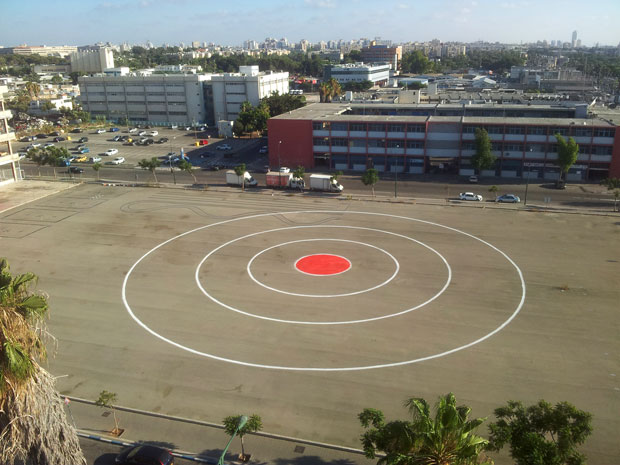
One of Dede Bandaid’s most well known works, a missile target painted in the middle of a large car park, a reference to the Gaza conflict in 2014. Image: Dede Bandaid / Wikicommons
Dede Bandaid is an anonymous Israeli artist who has added colour to Tel Aviv’s streets with thought provoking and politically relevant street art. His artistic career began in 2000 during his compulsory military service, and most of his earlier pieces demonstrated a clear anti-establishment sentiment. His more recent works, following the end of his stint in the military, aim to communicate social and political messages. One of his most well known works is a missile target painted in the middle of a large car park, a reference to the Gaza conflict in 2014.
Dede enjoys using public spaces as a canvas as this approach allows freer and more controversial expression, while also being accessible to and viewable by a larger audience especially when the street art is photographed and its images are circulated online. He also makes use of traditional symbols of peace, like the white dove, and frequently incorporates Band-Aids that represent healing and remedy in his artwork, with “Bandaid” being the pseudonym he signs on all his pieces. Over time, Dede’s style has evolved from stencilling to free-hand painting and collage and he interestingly also exhibits certain pieces in galleries across the world.
Cabbage Walker in Kashmir by Niharika Pandit.
A pheran-clad man walks around with a cabbage on a leash in the neighbourhoods of Srinagar, Kashmir. This performance act that he presents is inspired by Chinese artist Han Bing’s “Walking the Cabbage” social intervention work. While Bing chose to walk the cabbage to reflect on the changing values in the Chinese society, where once cabbage was a subsistence food product but is now only embraced by the poor, in Kashmir, this anonymous artist aims to normalise the cabbage walking to show the absurdity of militarisation in the region. Both the performances employ cabbage as an element of satire to expose the irony inherent in what how elitism and militarisation come to be normalised in societies across the world.
The Kashmiri Cabbage Walker writes on his blog, “I as a Kashmiri am willing to recognise walking the cabbage as part of the Kashmiri landscape but I will never accept the check posts, the bunkers, the army camps, the torture centers, the barbed wire, the curfews, the arrests, the toxic environment of conflict and war, as part of the same.”
This performance artist chooses to remain anonymous as it helps in focusing on the message and not the messenger. The Kashmiri Cabbage Walker says that he represents all Kashmiri lives under militarisation thereby revealing the artist’s identity becomes unimportant here.
Cracked pavements in Budapest by Fruzsina Katona.
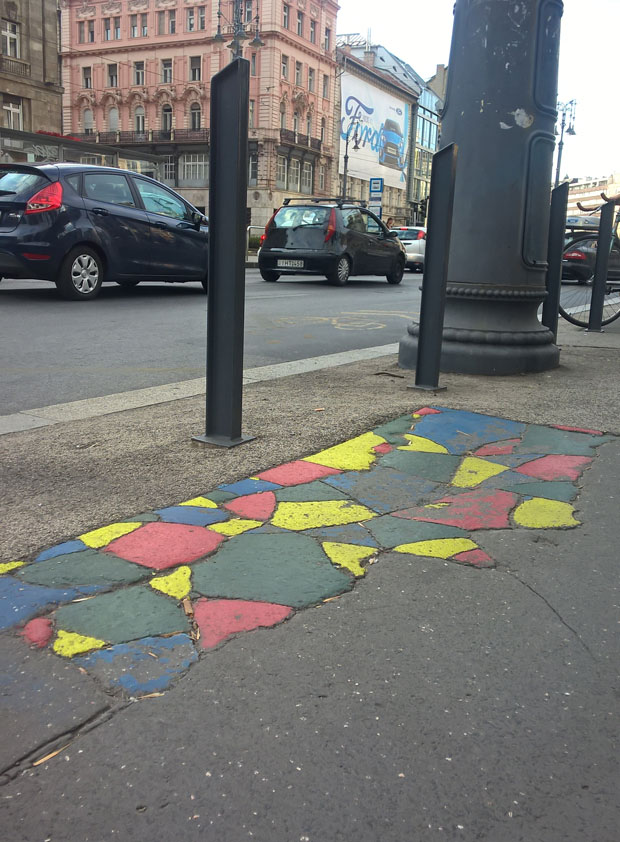
Anonymous volunteers have joined the satirial political party the Two-Tailed Dog party (MKKP) to paint cracked pavement on the streets of Budapest. Image: Fruzsina Katona
Anonymity does not necessarily mean that one is trying to hide his or her identity. Sometimes the identity of the person is utterly irrelevant. In Budapest, several anonymous volunteers are painting the streets of the city.
The pavement on the streets of the Hungarian capital are falling apart, ruining the image of the city and endangering those who walk on it. Authorities are known to do very little to fix the problem, but something had to be done. Hungary’s satiric political party, the Two-Tailed Dog party (MKKP) called for action and its artsy, anonymous volunteers started colouring the cracked pavement pieces resulting in dozens of cheerful spots across the city.
Unfortunately, there are some who find quarrels in a straw, and the police were called on the ad-hoc artists while they were peacefully decorating the pavement in a touristic neighbourhood. Now the volunteers are being prosecuted with vandalism.
But we still do not know their identity or how many of them are out decorating. All we know is that now we look at colourful patches of pavements while running our errands, instead of the sad and ugly cracked pavements.

![]() SUBSCRIBE NOW[/vc_column_text][/vc_column][/vc_row]
SUBSCRIBE NOW[/vc_column_text][/vc_column][/vc_row]






